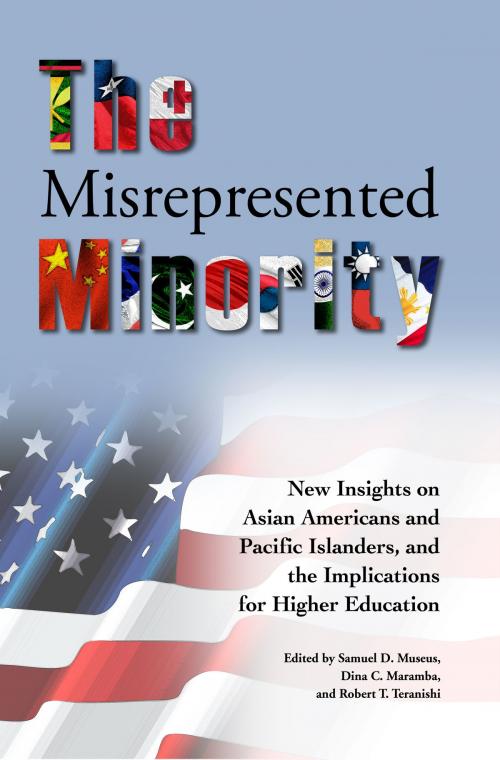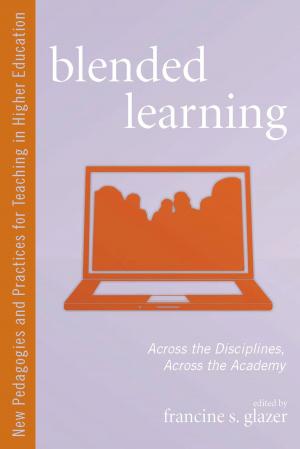The Misrepresented Minority
New Insights on Asian Americans and Pacific Islanders, and the Implications for Higher Education
Nonfiction, Reference & Language, Education & Teaching, Higher Education| Author: | ISBN: | 9781579229085 | |
| Publisher: | Stylus Publishing | Publication: | December 6, 2013 |
| Imprint: | Stylus Publishing | Language: | English |
| Author: | |
| ISBN: | 9781579229085 |
| Publisher: | Stylus Publishing |
| Publication: | December 6, 2013 |
| Imprint: | Stylus Publishing |
| Language: | English |
“I am highly impressed with the diversity of perspectives and issues on AAPIs addressed by this volume. It is an outstanding effort to overcome the disregard and invisibility of AAPIs in higher education and provides a more authentic and nuanced view that strongly challenges many pervasive stereotypes about this widely misunderstood but increasingly significant group.”?Dr. Bob H. Suzuki, President Emeritus, California State Polytechnic University, Pomona
“This book assembles an extensive array of extraordinarily authentic accounts of Asian American and Pacific Islander experiences. Each chapter uniquely synthesizes theory, research, and practice to inform efforts to effectuate positive campus environments for AAPIs. A must-read for policymakers, educators, and students who seek new insights and approaches to help AAPI college students succeed.”?Doris Ching, Emeritus Vice President for Student Affairs, University of Hawaii System
This book presents disaggregated data and offers new insights that promote more authentic understandings of the realities masked by the designation of AAPI. In offering new perspectives, conceptual frameworks, and empirical research by seasoned and emerging scholars, this book both makes a significant contribution to the emerging knowledge base on AAPIs, and identifies new directions for future scholarship on this population.
“This book assembles an extensive array of extraordinarily authentic accounts of Asian American and Pacific Islander experiences. Each chapter uniquely synthesizes theory, research, and practice to inform efforts to effectuate positive campus environments for AAPIs. A must-read for policymakers, educators, and students who seek new insights and approaches to help AAPI college students succeed.”?Doris Ching, Emeritus Vice President for Student Affairs, University of Hawaii System
This book presents disaggregated data and offers new insights that promote more authentic understandings of the realities masked by the designation of AAPI. In offering new perspectives, conceptual frameworks, and empirical research by seasoned and emerging scholars, this book both makes a significant contribution to the emerging knowledge base on AAPIs, and identifies new directions for future scholarship on this population.
“I am highly impressed with the diversity of perspectives and issues on AAPIs addressed by this volume. It is an outstanding effort to overcome the disregard and invisibility of AAPIs in higher education and provides a more authentic and nuanced view that strongly challenges many pervasive stereotypes about this widely misunderstood but increasingly significant group.”?Dr. Bob H. Suzuki, President Emeritus, California State Polytechnic University, Pomona
“This book assembles an extensive array of extraordinarily authentic accounts of Asian American and Pacific Islander experiences. Each chapter uniquely synthesizes theory, research, and practice to inform efforts to effectuate positive campus environments for AAPIs. A must-read for policymakers, educators, and students who seek new insights and approaches to help AAPI college students succeed.”?Doris Ching, Emeritus Vice President for Student Affairs, University of Hawaii System
This book presents disaggregated data and offers new insights that promote more authentic understandings of the realities masked by the designation of AAPI. In offering new perspectives, conceptual frameworks, and empirical research by seasoned and emerging scholars, this book both makes a significant contribution to the emerging knowledge base on AAPIs, and identifies new directions for future scholarship on this population.
“This book assembles an extensive array of extraordinarily authentic accounts of Asian American and Pacific Islander experiences. Each chapter uniquely synthesizes theory, research, and practice to inform efforts to effectuate positive campus environments for AAPIs. A must-read for policymakers, educators, and students who seek new insights and approaches to help AAPI college students succeed.”?Doris Ching, Emeritus Vice President for Student Affairs, University of Hawaii System
This book presents disaggregated data and offers new insights that promote more authentic understandings of the realities masked by the designation of AAPI. In offering new perspectives, conceptual frameworks, and empirical research by seasoned and emerging scholars, this book both makes a significant contribution to the emerging knowledge base on AAPIs, and identifies new directions for future scholarship on this population.















